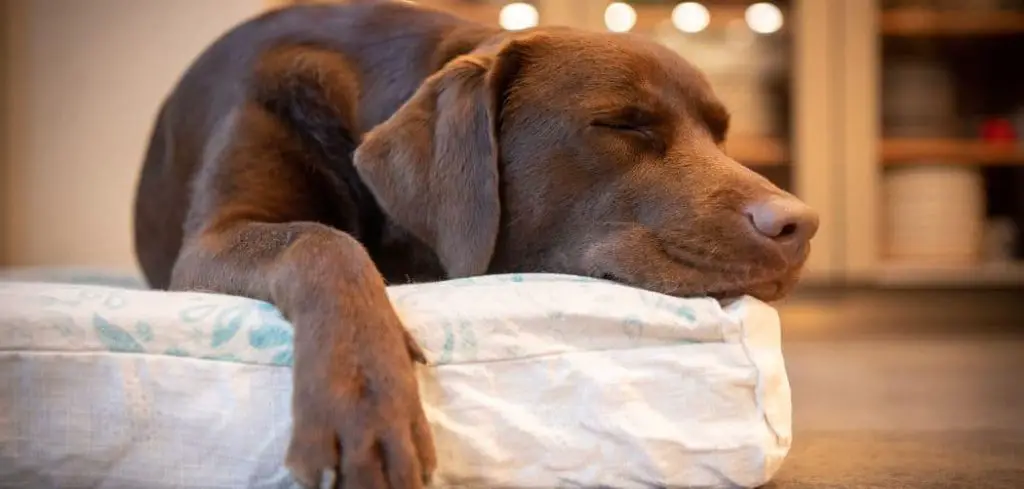If your dog only has diarrhea in the morning, it can leave you puzzled and concerned about what’s happening.
While a single loose stool may not always point to a serious issue, persistent morning diarrhea can signal underlying digestive or health problems that need attention.
We outline the common causes of morning diarrhea in dogs, what you can do at home, and when to seek veterinary help.
Dog Only Has Diarrhea in the Morning — Why It Happens
When a dog experiences diarrhea only in the morning, it is usually tied to digestion, feeding schedules, or an underlying condition that disrupts the intestines overnight. Food sensitivities, stress, gastrointestinal parasites, or inflammatory bowel conditions can cause the gut to work abnormally while your dog rests. By morning, this results in urgent, loose stools.
Some dogs may also struggle with meal timing, eating too late at night, or dietary imbalances that make their stomach more sensitive during early hours.
In other cases, diarrhea that appears only in the morning may be linked to infections, changes in gut bacteria, or stress-related responses.

Dog Only Has Diarrhea in the Morning: Common Causes
Diet and Feeding Schedule
If your dog’s meals are spaced too far apart or given very late at night, the digestive tract may become stressed, leading to diarrhea in the morning.
Some dogs cannot tolerate rich treats, fatty leftovers, or sudden changes in food. When undigested or irritating foods sit in the stomach overnight, the colon may respond with loose stools the next day.
This is especially true if your dog tends to eat a lot in the evening before bedtime.
Read more: Dog Only Has Diarrhea at Night (What it means)
Food Intolerance or Sensitivity
Dogs with food sensitivities often experience diarrhea that appears intermittently, sometimes in the morning after digesting certain ingredients overnight.
Proteins like beef, chicken, or dairy are common culprits, but grains or fillers can also be problematic.
The immune system reacts to these foods, creating inflammation in the gut that triggers watery or loose stools.
If your dog’s morning diarrhea happens frequently after eating the same food, sensitivity may be to blame.
Stress and Anxiety
Just like people, dogs can develop digestive issues when stressed. Anxiety about household changes, new routines, or separation can manifest as diarrhea in the morning.
Since cortisol (the stress hormone) levels tend to rise overnight, some dogs may show stress-related diarrhea when they first wake up.
This cause is more likely if your dog has other signs of anxiety such as pacing, whining, or clinginess.
Parasites and Infections
Intestinal parasites such as Giardia or whipworms can disrupt digestion and lead to diarrhea, sometimes more noticeable in the morning when the dog’s body first becomes active.
Bacterial infections can also create inflammation in the gut that triggers loose stools upon waking.
These causes are more common in younger dogs, recently adopted pets, or those exposed to contaminated water, food, or other dogs.
Inflammatory Bowel Disease (IBD)
IBD occurs when a dog’s intestines are chronically inflamed, leading to ongoing diarrhea that may be worse at certain times of day.
For some dogs, morning diarrhea becomes the most consistent symptom. Along with loose stools, you might notice weight loss, vomiting, or a decreased appetite.
Since IBD is a chronic condition, it requires veterinary management and sometimes long-term medication or diet changes.
Gut Flora Imbalance
A healthy gut relies on a balanced population of bacteria. If your dog recently took antibiotics, experienced a sudden diet change, or has ongoing digestive issues, their gut flora may become unbalanced.
This imbalance can lead to diarrhea, especially in the morning after the gut has slowed overnight. Probiotics and dietary adjustments are often recommended to restore balance.
What to Do If Your Dog Only Has Diarrhea in the Morning
If your dog only experiences diarrhea in the morning and otherwise seems healthy, you can try a few home approaches. First, consider adjusting meal timing.
Feeding smaller meals more evenly throughout the day can help reduce overnight digestive stress. Avoid giving fatty treats or large amounts of food right before bedtime.
Switching to a bland diet temporarily may also help. Plain boiled chicken and rice, given in smaller, frequent portions, can soothe the digestive system.
If your dog improves, you can gradually reintroduce their regular food. Keep track of any patterns that link diarrhea to certain foods.
For stress-related diarrhea, providing a calm bedtime routine and reducing anxiety triggers can make a difference. Some dog owners also find probiotics helpful in restoring balance to the gut.
Always ensure your dog stays hydrated, as diarrhea can quickly lead to dehydration.
If symptoms persist beyond a couple of days or worsen, it’s best to consult your veterinarian for further testing.
When to Call or Visit Your Vet
You should contact your veterinarian if your dog’s morning diarrhea lasts for more than two or three days, or if it is accompanied by concerning signs.
Blood in the stool, repeated vomiting, lethargy, or refusal to eat all indicate a more serious issue that requires professional care.
Puppies, senior dogs, and dogs with underlying health conditions are especially vulnerable to dehydration and complications.
Even if the diarrhea only appears in the morning, it may still point to parasites, chronic digestive disease, or another condition that needs treatment. A stool sample, blood test, or dietary trial may be necessary to identify the cause.
Read more: Dog Only Has Diarrhea on Walks (Why timing matters)
Key Takeaway
Morning diarrhea in dogs can be triggered by diet, food sensitivities, stress, parasites, or chronic intestinal conditions.
While a single episode is not always concerning, repeated morning diarrhea should not be ignored. With careful diet management, hydration, and monitoring, some mild cases can be managed at home.
However, persistent symptoms or additional health changes mean it’s time to see your vet. Addressing the cause early ensures your dog stays comfortable, healthy, and safe.
